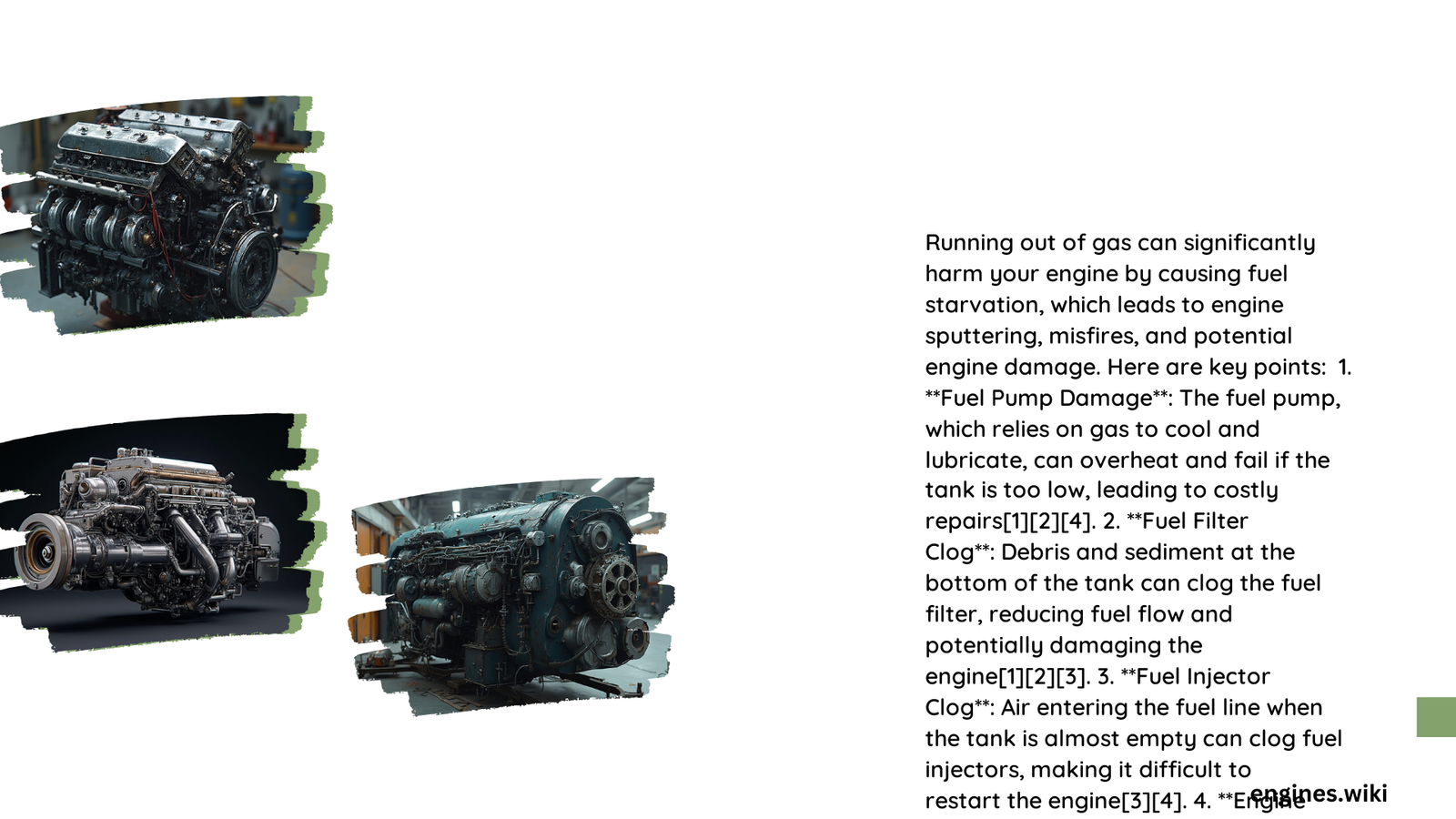Running out of gas can indeed hurt your engine, potentially causing significant damage and costly repairs. When your vehicle runs out of fuel, it can lead to fuel pump damage, fuel system contamination, and engine misfires. The fuel pump, which relies on fuel for cooling and lubrication, may overheat and fail. Debris from the bottom of the fuel tank can clog filters and injectors, leading to reduced performance and potential engine damage. Understanding these risks is crucial for maintaining your vehicle’s health and avoiding expensive repairs.
What Are the Specific Types of Engine Damage Caused by Running Out of Gas?
When a car runs out of gas, several types of engine damage and fuel system contamination can occur:
-
Fuel Pump Damage: The fuel pump, typically located inside the fuel tank, relies on fuel for cooling and lubrication. Running low on fuel can disrupt this process, causing the pump to overheat and potentially fail.
-
Fuel Filter Clogs: Debris and sediment at the bottom of the fuel tank can be sucked into the fuel system when fuel levels are low, clogging the fuel filter and potentially the fuel injectors.
-
Fuel Injector Clogs: Similar to the fuel filter, fuel injectors can become clogged with debris when fuel levels are low, leading to engine misfires and power loss.
-
Engine Misfires and Sputtering: Low fuel levels can cause the engine to draw in air, resulting in misfires and sputtering.
-
Exhaust System Damage: In some cases, fuel starvation can damage the catalytic converter, part of the exhaust system.
How Can You Quantify the Impact of Running Out of Gas on Your Engine?

The impact of running out of gas on your engine can be quantified in several ways:
-
Engine Failure Likelihood: The risk of engine failure increases significantly when the fuel tank is consistently run below ¼ full.
-
Symptoms to Monitor:
- Engine sputtering and misfires
- Intermittent power surges and engine backfires
- Loss of power and reduced fuel efficiency
- Harder braking and steering due to loss of hydraulic power
-
Fuel gauge warnings and low-fuel indicator lights
-
Conditions for Damage:
- Running the fuel tank below ¼ full regularly
- Ignoring fuel gauge warnings and low-fuel indicator lights
- Driving in conditions that increase fuel consumption (e.g., uphill, heavy loads)
- Older vehicles or diesel engines are more susceptible to damage
What Are the Estimated Repair Costs for Engine Damage Caused by Running Out of Gas?
Running out of gas can lead to various repair costs:
| Repair Type | Estimated Cost Range |
|---|---|
| Fuel Pump Replacement | $300 – $1,200 |
| Fuel Filter Cleaning/Replacement | $20 – $100 |
| Fuel Injector Cleaning/Replacement | $500 – $2,000+ |
| Additional Services (e.g., bleeding fuel system) | Varies |
These costs can vary depending on the vehicle model, labor rates, and the extent of the damage.
What Are the Precise Measurements and Specifications Related to Fuel Systems?
Understanding specific measurements and specifications can help prevent running out of gas:
-
Fuel Tank Capacity: Check your owner’s manual for the exact capacity of your car’s fuel tank. This information helps you gauge how much fuel remains when the gauge reads ‘E’.
-
Low Fuel Warning Light: Typically illuminates when there are between 7 and 11 liters of fuel remaining.
-
Fuel Pump Pressure: Maintaining proper fuel pump pressure is crucial. Running low on fuel can reduce this pressure, causing the pump to work harder and increasing the risk of failure.
How Can You Prevent Engine Damage from Running Out of Gas?
To protect your engine from damage caused by running out of gas:
- Keep your tank at least ¼ full at all times.
- Pay attention to your fuel gauge and warning lights.
- Plan your refueling stops, especially for long trips or in areas with sparse gas stations.
- Consider keeping an emergency gas can in your vehicle (but use caution and follow safety guidelines).
- Maintain your vehicle regularly to ensure optimal fuel efficiency.
What Are the Long-Term Effects of Repeatedly Running Out of Gas?
Repeatedly running out of gas can have serious long-term consequences:
- Increased wear on the fuel pump, potentially shortening its lifespan
- Accumulation of debris in the fuel system, leading to reduced performance over time
- Potential damage to the catalytic converter, affecting emissions control
- Increased risk of being stranded in potentially dangerous situations
- Higher overall maintenance costs due to more frequent repairs and replacements
By understanding the risks and taking proactive measures, you can protect your engine from the harmful effects of running out of gas and ensure your vehicle’s longevity and reliability.
References:
1. Capital One: 3 Reasons Why You Shouldn’t Run Your Car’s Gas Tank to Almost Empty
2. Firestone Complete Auto Care: What Happens to Your Car When You Run Out of Gas?
3. J.D. Power: What Happens When Your Car Runs Out of Gas?
